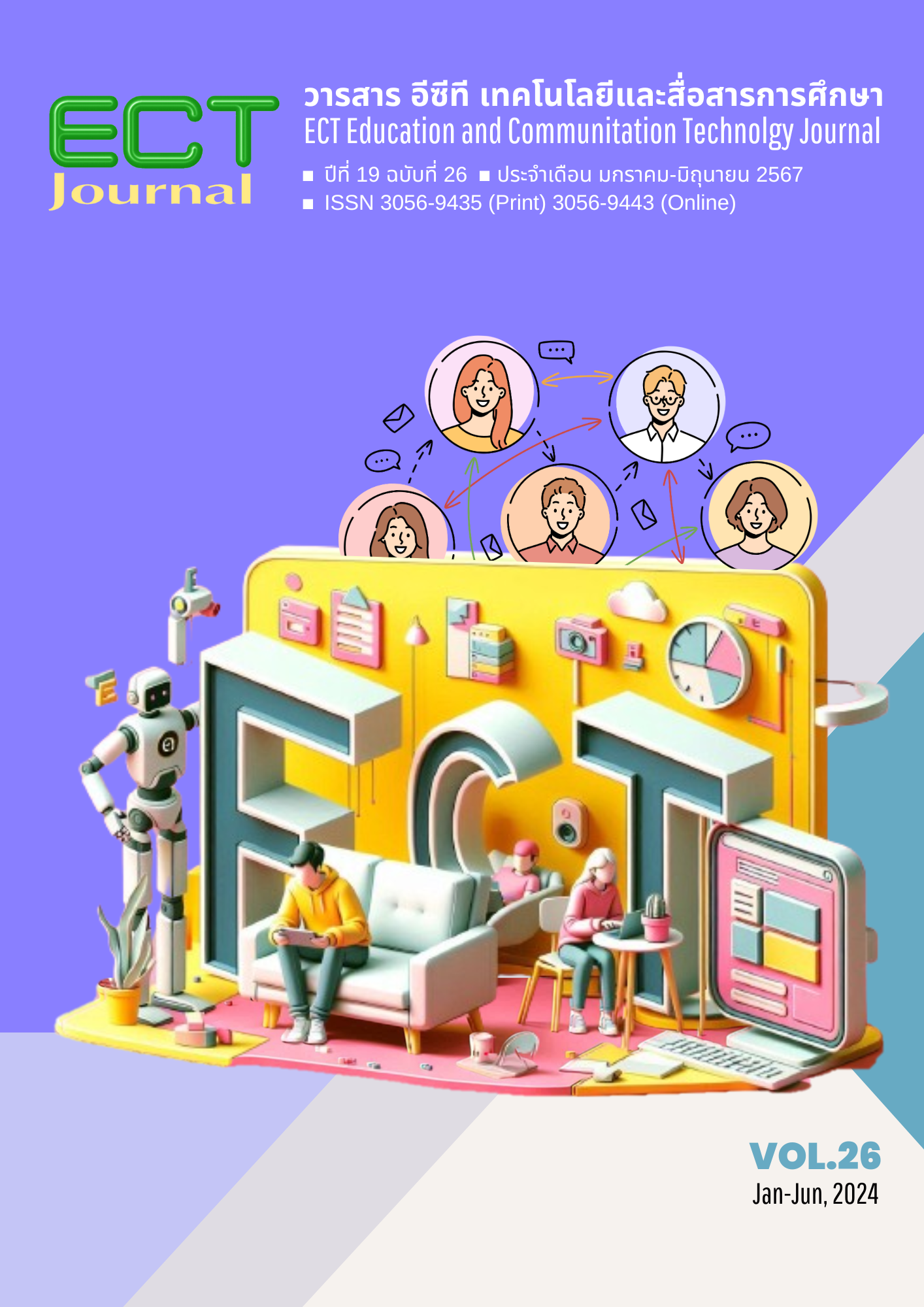Effects of Virtual Science Simulation-Based Learning in Online Collaboration Platform on Scientific Inquiry Competency of Lower Secondary Students
Keywords:
Virtual Science Simulation Based Learning, Scientific Inquiry Competency, Online Collaborative PlatformAbstract
The objectives of this study were 1) to investigate and to design a learning management system using virtual science simulations on a collaborative online platform in order to enhance the scientific inquiry skills of secondary school students, and 2) to study the effects of virtual science simulations on a collaborative online platform to develop scientific inquiry skills of secondary school students. The data collection tools used in this study were 1) a scientific inquiry skills assessment 2) a checklist for observing inquiring behaviors 3) a questionnaire on attitudes toward scientific inquiry, and 4) an evaluation form of learning outcomes based on students’ work. The study compared the levels of scientific inquiry skills between the experimental group, which learning activities on virtual science simulations with collaborative online platform (n=25), and the control group, which learning activities based on virtual science simulations (n=25). The results of the study found that 1) a learning management system using virtual science simulations on a collaborative online platform to develop scientific inquiry competency, consisting of 6 steps: 1) Concrete experience 2) Simulation briefing 3) Reflective observation & thinking 4) Conceptualization 5) Experimenting and 6) Elaboration. During a period of nine weeks, eighteen phases of data collecting were employed. 2) The results of using the model found that the experimental group had a greater level of scientific inquiry skills than the control group, with a statistical significance of.05. The data analysis was conducted using statistical techniques, including the T-test for independent samples to compare the groups' levels of scientific inquiry skills, and the T-test for dependent samples to compare the pre and post learning levels of scientific inquiry skills within the experimental group.
References
คณะกรรมการอิสระเพื่อการปฏิรูปการศึกษา. (2563). รายงานเฉพาะเรื่องที่ 12 หลักสูตรและการเรียนการสอนฐานสมรรถนะ. https://www.thaiedreform.org/wp-content/uploads/2020/01/CommissionReport14.pdf
สถาบันส่งเสริมการสอนวิทยาศาสตร์และเทคโนโลยี. (2563). ผลการประเมิน PISA 2018: นักเรียนไทยวัย 15 ปี รู้และทำอะไรได้บ้าง. https://pisathailand.ipst.ac.th/issue-2019-48/
Alshutwi, S., Alsharif, F., Shibily, F., Wedad M, A., Almotairy, M. M., & Algabbashi, M. (2022). Maintaining clinical training continuity during COVID-19 pandemic: Nursing students' perceptions about simulation-based learning. International Journal of Environmental Research and Public Health, 19(4), 2180. https://doi.org/10.3390/ijerph19042180
Chou, R. J., Liang, C. P., Huang, L. Y., & She, H. C. (2022). The Impacts of Online Skeuomorphic Physics Inquiry–Based Learning With and Without Simulation on 8th Graders’ Scientific Inquiry Performance. Journal of Science Education and Technology, 31(3), 357-371. https://doi.org/10.1007/s10956-022-09960-5
Henri, M., Johnson, M. D., & Nepal, B. (2017). A review of competency-based learning: Tools, assessments, and recommendations. Journal of Engineering Education, 106(4), 607-638. https://doi.org/10.1002/jee.20180
OECD. (2019a). PISA 2018 results (Volume I). https://www.oecd.org/economic-outlook/november-2019/
OECD. (2019b). PISA 2018 science framework. https://www.oecd.org/economic-outlook/november-2019/
Usman, M., & Huda, K. (2021). Virtual lab as distance learning media to enhance student's science process skill during the COVID-19 pandemic. In The 1st South East Asia Science, Technology, Engineering and Mathematics International Conference (SEA- STEM IC). (pp. 20-22). Indonesia. https://doi.org/10.1088/1742-6596/1882/1/012126
Yiasemides, K., Zachariadou, K., Moshonas, N., Rangoussi, M., & Charitopoulos, A. (2022). Development and assessment of a web-based platform for an active learning physics lab session on the linear regression technique. In IEEE Global Engineering Education Conference, EDUCON. (pp. 946-955). Tunisia. https://doi.org/10.1109/EDUCON52537.2022.9766479
Yuliati, L., Riantoni, C., & Mufti, N. (2018). Problem solving skills on direct current electricity through inquiry-based learning with PhET simulations. International Journal of Instruction, 11(4), 123-138. http://www.e-iji.net
Downloads
Published
How to Cite
Issue
Section
License
Copyright (c) 2024 มหาวิทยาลัยสุโขทัยธรรมาธิราช

This work is licensed under a Creative Commons Attribution-NonCommercial-NoDerivatives 4.0 International License.
1. ทรรศนะและข้อคิดเห็นใด ๆ ที่ปรากฏอยู่ในวารสาร ECT Education and Communication Technology Journal เป็นของผู้เขียนโดยเฉพาะ สำนักเทคโนโลยีการศึกษา มหาวิทยาลัยสุโขทัยธรรมาธิราช และกองบรรณาธิการไม่จำเป็นต้องเห็นพ้องด้วย
2. กองบรรณาธิการของสงวนลิขสิทธิ์ในการบรรณาธิการข้อเขียนทุกชิ้น เพื่อความเหมาะสมในการจัดพิมพ์เผยแพร่






